人教版(2019)高中英语必修三Unit 4-Space exploration语法探索+写作指导
文档属性
| 名称 | 人教版(2019)高中英语必修三Unit 4-Space exploration语法探索+写作指导 | 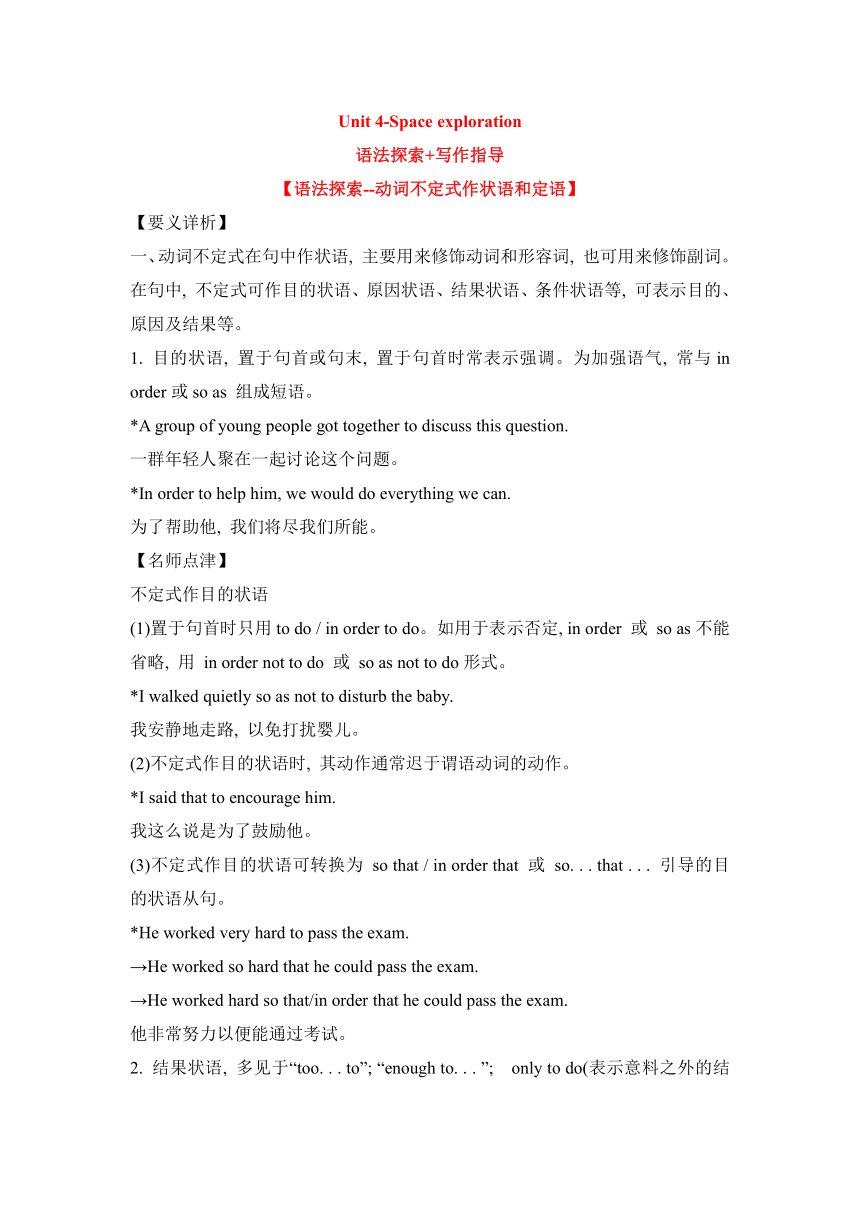 | |
| 格式 | doc | ||
| 文件大小 | 144.5KB | ||
| 资源类型 | 教案 | ||
| 版本资源 | 人教版(2019) | ||
| 科目 | 英语 | ||
| 更新时间 | 2021-06-04 06:22:18 | ||
图片预览

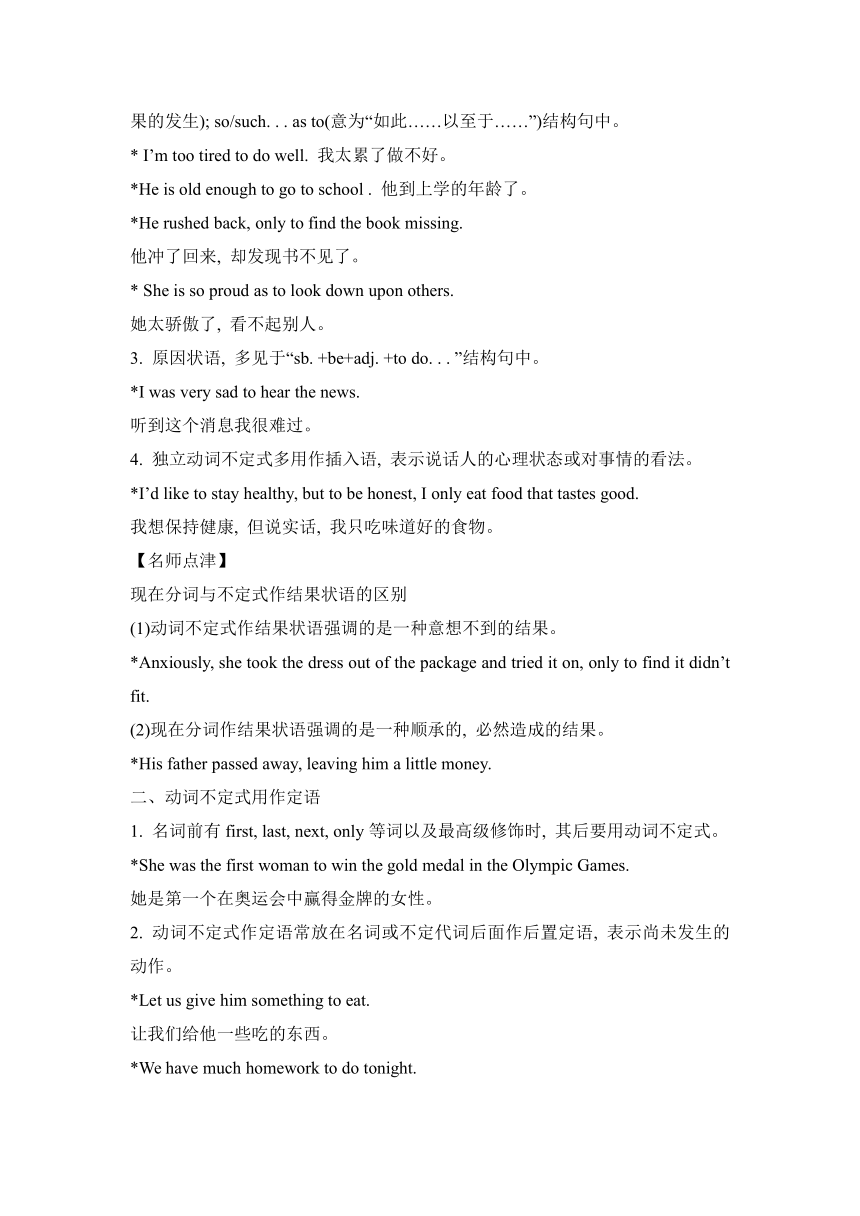
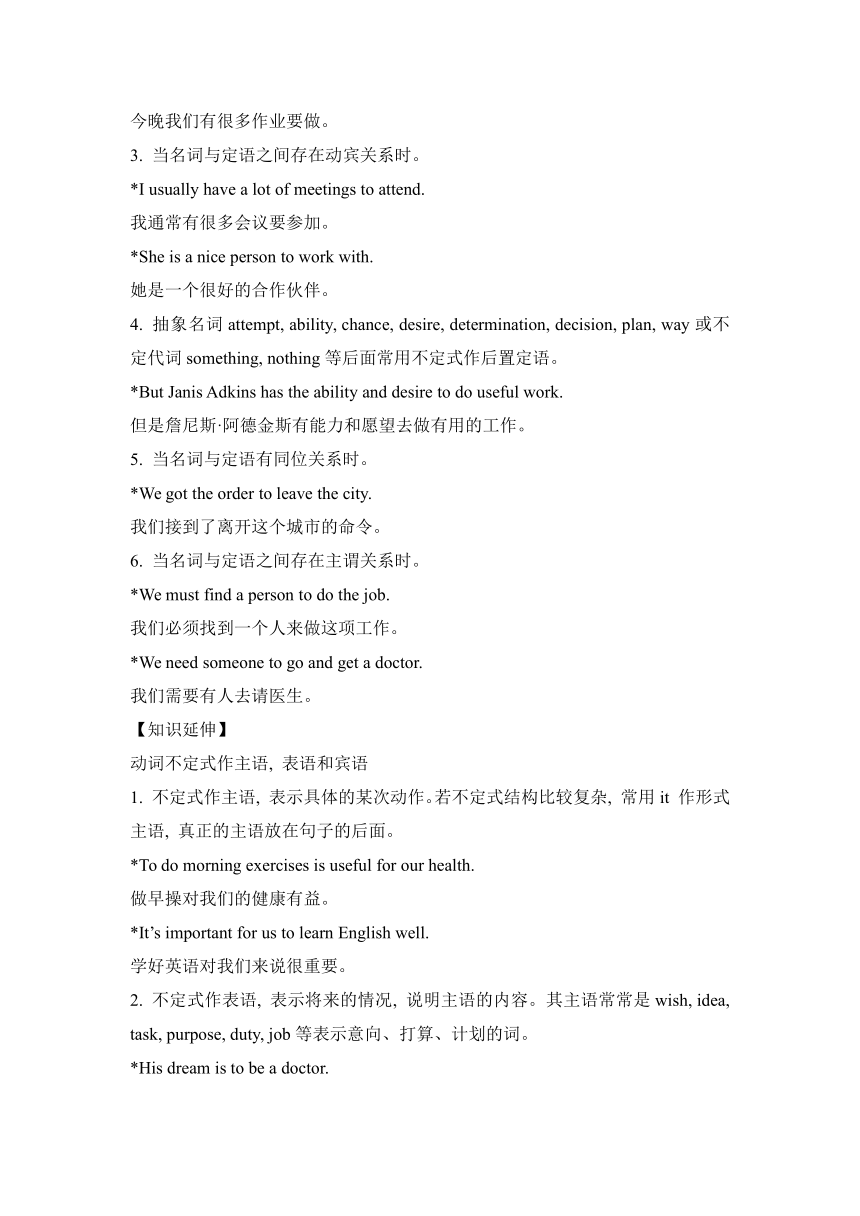
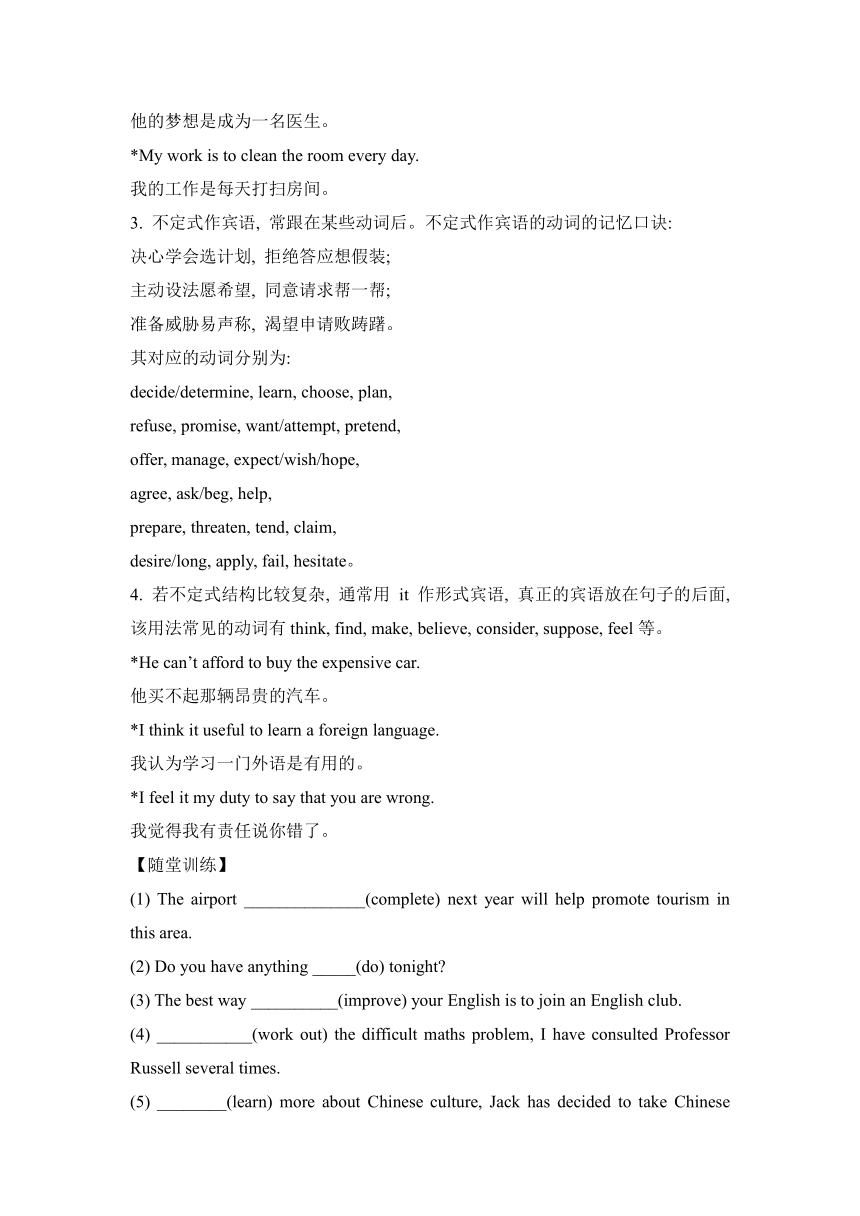
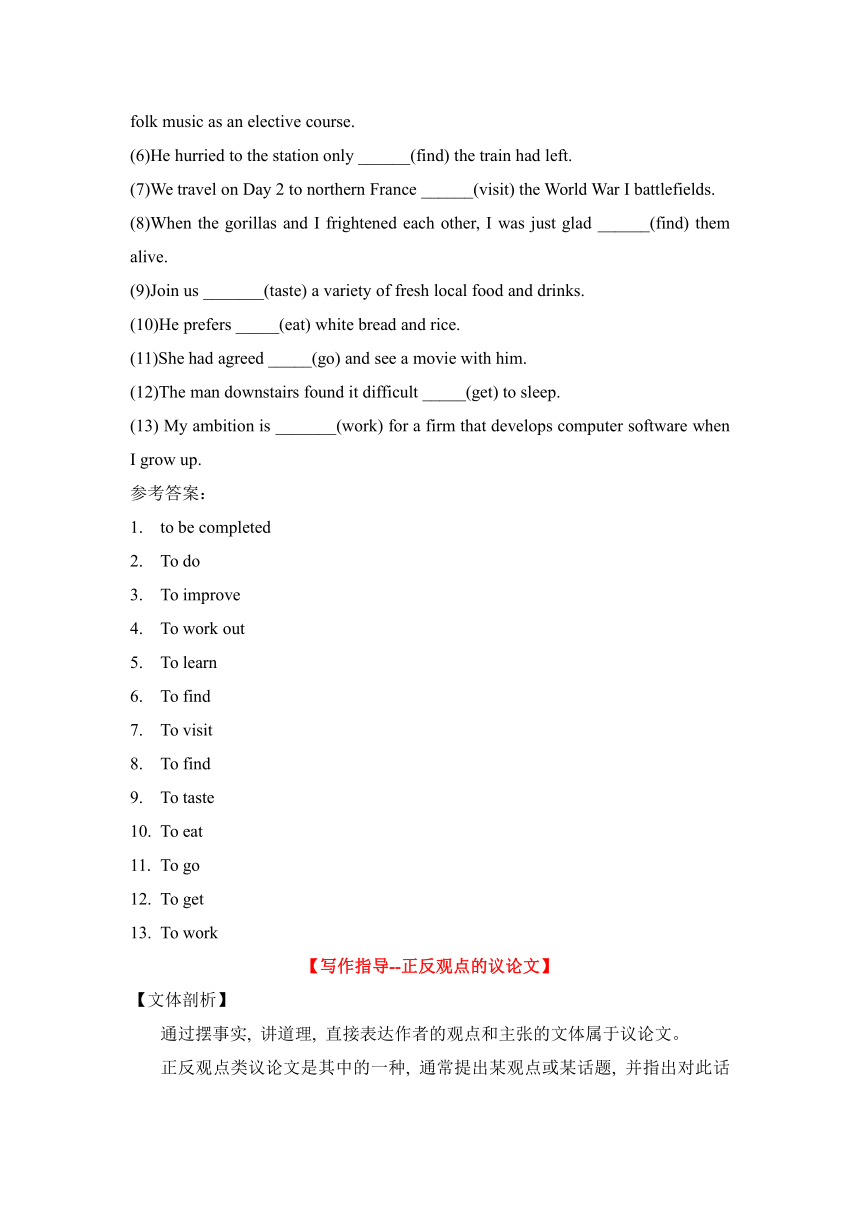
文档简介
Unit 4-Space exploration
语法探索+写作指导
【语法探索--动词不定式作状语和定语】
【要义详析】
一、动词不定式在句中作状语, 主要用来修饰动词和形容词, 也可用来修饰副词。
在句中, 不定式可作目的状语、原因状语、结果状语、条件状语等, 可表示目的、原因及结果等。
1. 目的状语, 置于句首或句末, 置于句首时常表示强调。为加强语气, 常与in order或so as 组成短语。
*A group of young people got together to discuss this question.
一群年轻人聚在一起讨论这个问题。
*In order to help him, we would do everything we can.
为了帮助他, 我们将尽我们所能。
【名师点津】
不定式作目的状语
(1)置于句首时只用to do / in order to do。如用于表示否定, in order 或 so as不能省略, 用 in order not to do 或 so as not to do形式。
*I walked quietly so as not to disturb the baby.
我安静地走路, 以免打扰婴儿。
(2)不定式作目的状语时, 其动作通常迟于谓语动词的动作。
*I said that to encourage him.
我这么说是为了鼓励他。
(3)不定式作目的状语可转换为 so that / in order that 或 so. . . that . . . 引导的目的状语从句。
*He worked very hard to pass the exam.
→He worked so hard that he could pass the exam.
→He worked hard so that/in order that he could pass the exam.
他非常努力以便能通过考试。
2. 结果状语, 多见于“too. . . to”; “enough to. . . ”; only to do(表示意料之外的结果的发生); so/such. . . as to(意为“如此……以至于……”)结构句中。
* I’m too tired to do well. 我太累了做不好。
*He is old enough to go to school . 他到上学的年龄了。
*He rushed back, only to find the book missing.
他冲了回来, 却发现书不见了。
* She is so proud as to look down upon others.
她太骄傲了, 看不起别人。
3. 原因状语, 多见于“sb. +be+adj. +to do. . . ”结构句中。
*I was very sad to hear the news.
听到这个消息我很难过。
4. 独立动词不定式多用作插入语, 表示说话人的心理状态或对事情的看法。
*I’d like to stay healthy, but to be honest, I only eat food that tastes good.
我想保持健康, 但说实话, 我只吃味道好的食物。
【名师点津】
现在分词与不定式作结果状语的区别
(1)动词不定式作结果状语强调的是一种意想不到的结果。
*Anxiously, she took the dress out of the package and tried it on, only to find it didn’t fit.
(2)现在分词作结果状语强调的是一种顺承的, 必然造成的结果。
*His father passed away, leaving him a little money.
二、动词不定式用作定语
1. 名词前有first, last, next, only等词以及最高级修饰时, 其后要用动词不定式。
*She was the first woman to win the gold medal in the Olympic Games.
她是第一个在奥运会中赢得金牌的女性。
2. 动词不定式作定语常放在名词或不定代词后面作后置定语, 表示尚未发生的动作。
*Let us give him something to eat.
让我们给他一些吃的东西。
*We have much homework to do tonight.
今晚我们有很多作业要做。
3. 当名词与定语之间存在动宾关系时。
*I usually have a lot of meetings to attend.
我通常有很多会议要参加。
*She is a nice person to work with.
她是一个很好的合作伙伴。
4. 抽象名词attempt, ability, chance, desire, determination, decision, plan, way或不定代词something, nothing等后面常用不定式作后置定语。
*But Janis Adkins has the ability and desire to do useful work.
但是詹尼斯·阿德金斯有能力和愿望去做有用的工作。
5. 当名词与定语有同位关系时。
*We got the order to leave the city.
我们接到了离开这个城市的命令。
6. 当名词与定语之间存在主谓关系时。
*We must find a person to do the job.
我们必须找到一个人来做这项工作。
*We need someone to go and get a doctor.
我们需要有人去请医生。
【知识延伸】
动词不定式作主语, 表语和宾语
1. 不定式作主语, 表示具体的某次动作。若不定式结构比较复杂, 常用it 作形式主语, 真正的主语放在句子的后面。
*To do morning exercises is useful for our health.
做早操对我们的健康有益。
*It’s important for us to learn English well.
学好英语对我们来说很重要。
2. 不定式作表语, 表示将来的情况, 说明主语的内容。其主语常常是wish, idea, task, purpose, duty, job等表示意向、打算、计划的词。
*His dream is to be a doctor.
他的梦想是成为一名医生。
*My work is to clean the room every day.
我的工作是每天打扫房间。
3. 不定式作宾语, 常跟在某些动词后。不定式作宾语的动词的记忆口诀:
决心学会选计划, 拒绝答应想假装;
主动设法愿希望, 同意请求帮一帮;
准备威胁易声称, 渴望申请败踌躇。
其对应的动词分别为:
decide/determine, learn, choose, plan,
refuse, promise, want/attempt, pretend,
offer, manage, expect/wish/hope,
agree, ask/beg, help,
prepare, threaten, tend, claim,
desire/long, apply, fail, hesitate。
4. 若不定式结构比较复杂, 通常用 it 作形式宾语, 真正的宾语放在句子的后面, 该用法常见的动词有think, find, make, believe, consider, suppose, feel等。
*He can’t afford to buy the expensive car.
他买不起那辆昂贵的汽车。
*I think it useful to learn a foreign language.
我认为学习一门外语是有用的。
*I feel it my duty to say that you are wrong.
我觉得我有责任说你错了。
【随堂训练】
(1) The airport ______________(complete) next year will help promote tourism in this area. ?
(2) Do you have anything _____(do) tonight? ?
(3) The best way __________(improve) your English is to join an English club. ?
(4) ___________(work out) the difficult maths problem, I have consulted Professor Russell several times. ?
(5) ________(learn) more about Chinese culture, Jack has decided to take Chinese folk music as an elective course. ?
(6)He hurried to the station only ______(find) the train had left. ?
(7)We travel on Day 2 to northern France ______(visit) the World War Ⅰ battlefields. ?
(8)When the gorillas and I frightened each other, I was just glad ______(find) them alive. ?
(9)Join us _______(taste) a variety of fresh local food and drinks. ?
(10)He prefers _____(eat) white bread and rice. ?
(11)She had agreed _____(go) and see a movie with him. ?
(12)The man downstairs found it difficult _____(get) to sleep. ?
(13) My ambition is _______(work) for a firm that develops computer software when I grow up. ?
参考答案:
to be completed
To do
To improve
To work out
To learn
To find
To visit
To find
To taste
To eat
To go
To get
To work
【写作指导--正反观点的议论文】
【文体剖析】
通过摆事实, 讲道理, 直接表达作者的观点和主张的文体属于议论文。
正反观点类议论文是其中的一种, 通常提出某观点或某话题, 并指出对此话题产生的两种对立观点, 对正反两方面的论点进行论证, 最后给出自己的看法。
【话题词汇】
1. result in 导致
2. in closing 最后
3. be opposed to 反对
4. be in favor of 赞成, 支持
5. be widely used 被广泛使用
6. as far as I am concerned 在我看来
7. make a difference 起作用, 有影响
8. take . . . into consideration 把……考虑在内
9. some people argue that. . . 一些人主张……
10. on the one hand. . . , on the other hand. . . 一方面……, 另一方面……
11. benefit from China’s space programme从中国的太空项目中获益
12. become the first Chinese astronaut成为中国第一位宇航员
13. receive mental and physical training接受心理上和身体上的训练
14. in the filed of science 在科学领域
15. improve the quality of life 提高生活质量
16. negative effect 负面影响
17. scientific breakthrough 科学突破
18. be curious about astronauts’ life in space 对宇航员在太空的生活感到好奇
19. make our life more comfortable and convenient 使我们的生活更加舒适、方便
20. with the development of aerospace science and technology
随着航空航天科技的发展
【话题句式】
1. Different people have different views on space exploration.
不同的人对太空探索有不同的看法。
2. It makes us feel proud of our nation.
它使我们为我们的国家感到自豪。
3. Every coin has two sides. 事物都有两面性。
4. Generally speaking, its advantages can be seen as follows.
一般来说, 它的优点如下。
5. Some people firmly believe we benefit a lot from the scientific advancements in many different ways.
有些人坚信, 我们从许多不同方面的科学进步中获益良多。
6. Taking all factors into consideration, we may safely come to the conclusion that there are quite a few opportunities in our society.
把所有的因素加以考虑, 我们可以有把握地得出结论: 在我们的社会中存在着相当多的机会。
7. There is no doubt that we benefit a lot from the scientific advancements in many different ways.
毫无疑问, 在许多不同的方面科学的进步使我们受益良多。
8 However, we should be aware of the negative effects that cellphones have brought to us.
然而, 我们应该意识到手机给我们带来的负面影响。
9. I have long been interested in space exploration.
长期以来我一直对太空探索感兴趣。
10. How I wish I had a chance to travel into space!
我多么希望我有机会去太空旅行!
11. The development of science and technology makes our life more comfortable and convenient.
科技的发展使我们的生活更加舒适、方便。
12. The journey to outer space and other planets is not a dream any more.
去外太空和其他星球旅行不再是个梦。
【典题演练】
最近, 你班同学就“太空是否值得探索”这一话题展开了一场讨论。请你根据下表提供的信息, 用英语写一篇短文介绍讨论的情况, 并谈谈自己的看法。
30%的同学认为太空不值得探索。理由:
1. 离我们及我们的日常生活太遥远。
2. 浪费金钱。
70%的同学认为太空值得探索。理由:
1. 已使用卫星进行通讯传播、天气预报。
2. 有望解决人口问题。
注意: 1. 词数80左右;
2. 可适当增加细节, 以使行文连贯。
【谋篇】
【遣词】
1. 进行了一次热烈的讨论 _____________________?
2. 持有不同的观点 __________________
3离……太遥远 __________________?
4. 解决人口问题 __________________________?
5. 在我看来 ____________________?
6. 值得做某事 _____________?
7. 从……中受益 ____________
8. 促进 ________
have a heated discussion
hold different ideas?
too far away from. . .
solve the population problems
as far as I’m concerned
be worth doing
be worth doing
Promote
【造句】
1. 完成句子
(1)最近我们班进行了一次热烈的讨论。
(2)讨论的话题是太空是否值得探索。
(3)30%的同学认为不值得探索。
(4)他们认为太空探索离我们及我们的日常生活太遥远并且浪费金钱。
(5)然而70%的同学认为值得探索。
(6)我们从中受益很多, 如使用卫星进行通讯传播、天气预报。
(7)在我看来, 探索太空是值得的。
2. 句式升级
(8)用whether引导宾语从句, 将(1)(2)句连接起来
(9)用非谓语动词连接(3)(4)句
(10)用because引导原因状语从句连接(5)(6)句
Recently our class had a heated discussion.
The topic is whether space is worth exploring.
30% of us think space exploration is not worthwhile.
They hold the belief that space exploration is too far away from us and our daily life and is a waste of money.
However, 70% think space is worth exploring.
We have benefited a lot from it, such as using satellites for communication and weather forecast.
As far as I am concerned, it is worthwhile to explore the space.
Recently our class had a heated discussion on whether is worth exploring.
30% of us think space exploration is not worthwhile,holding the belief that space exploration is too far away from us and our daily life and is a waste of money.
However, 70% think space is worth exploring because We have benefited a lot from it, such as using satellites for communication and weather forecast.
【成篇】
Recently our class had a heated discussion on whether space is worth exploring. Students hold different ideas about it. ?
30% of us think space exploration is not worthwhile, holding the belief that space exploration is too far away from us and our daily life and is a waste of money. ?
However, 70% think space is worth exploring because we have benefited a lot from it, such as using satellites for communication and weather forecast. What’s more, with further space research, we may solve the population problem by moving to other planets one day. ?
As far as I am concerned, it is worthwhile to explore the space. Not only can it promote the development of society but also enrich our life.
语法探索+写作指导
【语法探索--动词不定式作状语和定语】
【要义详析】
一、动词不定式在句中作状语, 主要用来修饰动词和形容词, 也可用来修饰副词。
在句中, 不定式可作目的状语、原因状语、结果状语、条件状语等, 可表示目的、原因及结果等。
1. 目的状语, 置于句首或句末, 置于句首时常表示强调。为加强语气, 常与in order或so as 组成短语。
*A group of young people got together to discuss this question.
一群年轻人聚在一起讨论这个问题。
*In order to help him, we would do everything we can.
为了帮助他, 我们将尽我们所能。
【名师点津】
不定式作目的状语
(1)置于句首时只用to do / in order to do。如用于表示否定, in order 或 so as不能省略, 用 in order not to do 或 so as not to do形式。
*I walked quietly so as not to disturb the baby.
我安静地走路, 以免打扰婴儿。
(2)不定式作目的状语时, 其动作通常迟于谓语动词的动作。
*I said that to encourage him.
我这么说是为了鼓励他。
(3)不定式作目的状语可转换为 so that / in order that 或 so. . . that . . . 引导的目的状语从句。
*He worked very hard to pass the exam.
→He worked so hard that he could pass the exam.
→He worked hard so that/in order that he could pass the exam.
他非常努力以便能通过考试。
2. 结果状语, 多见于“too. . . to”; “enough to. . . ”; only to do(表示意料之外的结果的发生); so/such. . . as to(意为“如此……以至于……”)结构句中。
* I’m too tired to do well. 我太累了做不好。
*He is old enough to go to school . 他到上学的年龄了。
*He rushed back, only to find the book missing.
他冲了回来, 却发现书不见了。
* She is so proud as to look down upon others.
她太骄傲了, 看不起别人。
3. 原因状语, 多见于“sb. +be+adj. +to do. . . ”结构句中。
*I was very sad to hear the news.
听到这个消息我很难过。
4. 独立动词不定式多用作插入语, 表示说话人的心理状态或对事情的看法。
*I’d like to stay healthy, but to be honest, I only eat food that tastes good.
我想保持健康, 但说实话, 我只吃味道好的食物。
【名师点津】
现在分词与不定式作结果状语的区别
(1)动词不定式作结果状语强调的是一种意想不到的结果。
*Anxiously, she took the dress out of the package and tried it on, only to find it didn’t fit.
(2)现在分词作结果状语强调的是一种顺承的, 必然造成的结果。
*His father passed away, leaving him a little money.
二、动词不定式用作定语
1. 名词前有first, last, next, only等词以及最高级修饰时, 其后要用动词不定式。
*She was the first woman to win the gold medal in the Olympic Games.
她是第一个在奥运会中赢得金牌的女性。
2. 动词不定式作定语常放在名词或不定代词后面作后置定语, 表示尚未发生的动作。
*Let us give him something to eat.
让我们给他一些吃的东西。
*We have much homework to do tonight.
今晚我们有很多作业要做。
3. 当名词与定语之间存在动宾关系时。
*I usually have a lot of meetings to attend.
我通常有很多会议要参加。
*She is a nice person to work with.
她是一个很好的合作伙伴。
4. 抽象名词attempt, ability, chance, desire, determination, decision, plan, way或不定代词something, nothing等后面常用不定式作后置定语。
*But Janis Adkins has the ability and desire to do useful work.
但是詹尼斯·阿德金斯有能力和愿望去做有用的工作。
5. 当名词与定语有同位关系时。
*We got the order to leave the city.
我们接到了离开这个城市的命令。
6. 当名词与定语之间存在主谓关系时。
*We must find a person to do the job.
我们必须找到一个人来做这项工作。
*We need someone to go and get a doctor.
我们需要有人去请医生。
【知识延伸】
动词不定式作主语, 表语和宾语
1. 不定式作主语, 表示具体的某次动作。若不定式结构比较复杂, 常用it 作形式主语, 真正的主语放在句子的后面。
*To do morning exercises is useful for our health.
做早操对我们的健康有益。
*It’s important for us to learn English well.
学好英语对我们来说很重要。
2. 不定式作表语, 表示将来的情况, 说明主语的内容。其主语常常是wish, idea, task, purpose, duty, job等表示意向、打算、计划的词。
*His dream is to be a doctor.
他的梦想是成为一名医生。
*My work is to clean the room every day.
我的工作是每天打扫房间。
3. 不定式作宾语, 常跟在某些动词后。不定式作宾语的动词的记忆口诀:
决心学会选计划, 拒绝答应想假装;
主动设法愿希望, 同意请求帮一帮;
准备威胁易声称, 渴望申请败踌躇。
其对应的动词分别为:
decide/determine, learn, choose, plan,
refuse, promise, want/attempt, pretend,
offer, manage, expect/wish/hope,
agree, ask/beg, help,
prepare, threaten, tend, claim,
desire/long, apply, fail, hesitate。
4. 若不定式结构比较复杂, 通常用 it 作形式宾语, 真正的宾语放在句子的后面, 该用法常见的动词有think, find, make, believe, consider, suppose, feel等。
*He can’t afford to buy the expensive car.
他买不起那辆昂贵的汽车。
*I think it useful to learn a foreign language.
我认为学习一门外语是有用的。
*I feel it my duty to say that you are wrong.
我觉得我有责任说你错了。
【随堂训练】
(1) The airport ______________(complete) next year will help promote tourism in this area. ?
(2) Do you have anything _____(do) tonight? ?
(3) The best way __________(improve) your English is to join an English club. ?
(4) ___________(work out) the difficult maths problem, I have consulted Professor Russell several times. ?
(5) ________(learn) more about Chinese culture, Jack has decided to take Chinese folk music as an elective course. ?
(6)He hurried to the station only ______(find) the train had left. ?
(7)We travel on Day 2 to northern France ______(visit) the World War Ⅰ battlefields. ?
(8)When the gorillas and I frightened each other, I was just glad ______(find) them alive. ?
(9)Join us _______(taste) a variety of fresh local food and drinks. ?
(10)He prefers _____(eat) white bread and rice. ?
(11)She had agreed _____(go) and see a movie with him. ?
(12)The man downstairs found it difficult _____(get) to sleep. ?
(13) My ambition is _______(work) for a firm that develops computer software when I grow up. ?
参考答案:
to be completed
To do
To improve
To work out
To learn
To find
To visit
To find
To taste
To eat
To go
To get
To work
【写作指导--正反观点的议论文】
【文体剖析】
通过摆事实, 讲道理, 直接表达作者的观点和主张的文体属于议论文。
正反观点类议论文是其中的一种, 通常提出某观点或某话题, 并指出对此话题产生的两种对立观点, 对正反两方面的论点进行论证, 最后给出自己的看法。
【话题词汇】
1. result in 导致
2. in closing 最后
3. be opposed to 反对
4. be in favor of 赞成, 支持
5. be widely used 被广泛使用
6. as far as I am concerned 在我看来
7. make a difference 起作用, 有影响
8. take . . . into consideration 把……考虑在内
9. some people argue that. . . 一些人主张……
10. on the one hand. . . , on the other hand. . . 一方面……, 另一方面……
11. benefit from China’s space programme从中国的太空项目中获益
12. become the first Chinese astronaut成为中国第一位宇航员
13. receive mental and physical training接受心理上和身体上的训练
14. in the filed of science 在科学领域
15. improve the quality of life 提高生活质量
16. negative effect 负面影响
17. scientific breakthrough 科学突破
18. be curious about astronauts’ life in space 对宇航员在太空的生活感到好奇
19. make our life more comfortable and convenient 使我们的生活更加舒适、方便
20. with the development of aerospace science and technology
随着航空航天科技的发展
【话题句式】
1. Different people have different views on space exploration.
不同的人对太空探索有不同的看法。
2. It makes us feel proud of our nation.
它使我们为我们的国家感到自豪。
3. Every coin has two sides. 事物都有两面性。
4. Generally speaking, its advantages can be seen as follows.
一般来说, 它的优点如下。
5. Some people firmly believe we benefit a lot from the scientific advancements in many different ways.
有些人坚信, 我们从许多不同方面的科学进步中获益良多。
6. Taking all factors into consideration, we may safely come to the conclusion that there are quite a few opportunities in our society.
把所有的因素加以考虑, 我们可以有把握地得出结论: 在我们的社会中存在着相当多的机会。
7. There is no doubt that we benefit a lot from the scientific advancements in many different ways.
毫无疑问, 在许多不同的方面科学的进步使我们受益良多。
8 However, we should be aware of the negative effects that cellphones have brought to us.
然而, 我们应该意识到手机给我们带来的负面影响。
9. I have long been interested in space exploration.
长期以来我一直对太空探索感兴趣。
10. How I wish I had a chance to travel into space!
我多么希望我有机会去太空旅行!
11. The development of science and technology makes our life more comfortable and convenient.
科技的发展使我们的生活更加舒适、方便。
12. The journey to outer space and other planets is not a dream any more.
去外太空和其他星球旅行不再是个梦。
【典题演练】
最近, 你班同学就“太空是否值得探索”这一话题展开了一场讨论。请你根据下表提供的信息, 用英语写一篇短文介绍讨论的情况, 并谈谈自己的看法。
30%的同学认为太空不值得探索。理由:
1. 离我们及我们的日常生活太遥远。
2. 浪费金钱。
70%的同学认为太空值得探索。理由:
1. 已使用卫星进行通讯传播、天气预报。
2. 有望解决人口问题。
注意: 1. 词数80左右;
2. 可适当增加细节, 以使行文连贯。
【谋篇】
【遣词】
1. 进行了一次热烈的讨论 _____________________?
2. 持有不同的观点 __________________
3离……太遥远 __________________?
4. 解决人口问题 __________________________?
5. 在我看来 ____________________?
6. 值得做某事 _____________?
7. 从……中受益 ____________
8. 促进 ________
have a heated discussion
hold different ideas?
too far away from. . .
solve the population problems
as far as I’m concerned
be worth doing
be worth doing
Promote
【造句】
1. 完成句子
(1)最近我们班进行了一次热烈的讨论。
(2)讨论的话题是太空是否值得探索。
(3)30%的同学认为不值得探索。
(4)他们认为太空探索离我们及我们的日常生活太遥远并且浪费金钱。
(5)然而70%的同学认为值得探索。
(6)我们从中受益很多, 如使用卫星进行通讯传播、天气预报。
(7)在我看来, 探索太空是值得的。
2. 句式升级
(8)用whether引导宾语从句, 将(1)(2)句连接起来
(9)用非谓语动词连接(3)(4)句
(10)用because引导原因状语从句连接(5)(6)句
Recently our class had a heated discussion.
The topic is whether space is worth exploring.
30% of us think space exploration is not worthwhile.
They hold the belief that space exploration is too far away from us and our daily life and is a waste of money.
However, 70% think space is worth exploring.
We have benefited a lot from it, such as using satellites for communication and weather forecast.
As far as I am concerned, it is worthwhile to explore the space.
Recently our class had a heated discussion on whether is worth exploring.
30% of us think space exploration is not worthwhile,holding the belief that space exploration is too far away from us and our daily life and is a waste of money.
However, 70% think space is worth exploring because We have benefited a lot from it, such as using satellites for communication and weather forecast.
【成篇】
Recently our class had a heated discussion on whether space is worth exploring. Students hold different ideas about it. ?
30% of us think space exploration is not worthwhile, holding the belief that space exploration is too far away from us and our daily life and is a waste of money. ?
However, 70% think space is worth exploring because we have benefited a lot from it, such as using satellites for communication and weather forecast. What’s more, with further space research, we may solve the population problem by moving to other planets one day. ?
As far as I am concerned, it is worthwhile to explore the space. Not only can it promote the development of society but also enrich our life.
